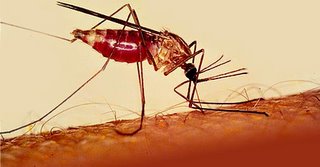
This kind of articles always reminds me of the constant gardener film
New malaria treatment guidelines issued by WHO
19 JANUARY 2006 WASHINGTON, DC -- The World Health Organization (WHO) today requested pharmaceutical companies to end the marketing and sale of “single-drug” artemisinin malaria medicines, in order to prevent malaria parasites from developing resistance to this drug.
The use of single-drug artemisinin treatment – or monotherapy – hastens development of resistance by weakening but not killing the parasite. When used correctly in combination with other anti-malarial drugs in Artemisinin Combination Therapies (ACTs), artemisinin is nearly 95% effective in curing malaria and the parasite is highly unlikely to become drug resistant. ACTs are currently the most effective medicine available to treat malaria.
"It is critical that artemisinins be used correctly," said Dr LEE Jong-wook, WHO's Director-General. "We request pharmaceutical companies to immediately stop marketing single-drug artemisinin tablets and instead market artemisinin combination therapies only. The new treatment guidelines we are releasing today provide countries with clear and evidence-based direction on the best treatment options for malaria."
According to the new WHO malaria treatment guidelines, uncomplicated falciparum malaria must be treated with ACTs and not by artemisinin alone or any other monotherapy.
“So far, no treatment failures due to artemisinin drug resistance have been documented, but we are watching the situation very attentively,” said Dr Arata Kochi, the newly appointed director of WHO's malaria department. “We are concerned about decreased sensitivity to the drug in South-East Asia which is the region that has traditionally been the birthplace of anti-malarial drug resistance.”
In Thailand, sulfadoxine-pyrimethanime (SP) was initially almost 100% effective in curing malaria when introduced in 1977, but within five years was curing only 10% of cases due to drug resistance. The once-popular chloroquine has lost its effectiveness in almost every part of the world. Between 1999 and 2004, 95% of African children treated for malaria were given chloroquine, even though the drug only cured half of malaria cases in many countries. Resistance to atovaquone developed within one year of introduction in 1997.
WHO also announced other measures it will take to maximize the benefits and correct use of ACTs. In order to contain the circulation and use of counterfeit antimalarial medicines, WHO plans to strengthen its collaboration with international and national health and regulatory authorities. It is estimated that up to 25% of medicines consumed in developing countries are counterfeit or sub-standard. In parts of Africa and Asia this figure exceeds 50%, according to a WHO report on counterfeit drugs.
Additionally, to anticipate and prevent the onset and spread of drug resistance in the long term, WHO urges the global malaria research community and the pharmaceutical industry to rapidly invest in the design of the next generation of antimalarial drugs. By creating ACTs with multiple-drug combinations and transmission blocking components, resistance can be prevented.
“Our biggest concern right now is to treat patients with safe and effective medication and to avoid the emergence of drug resistance. If we lose ACTs, we’ll no longer have a cure for malaria,” said Dr Arata Kochi,“ and it will probably be at least ten years before a new one can be discovered.”
Sem comentários:
Enviar um comentário